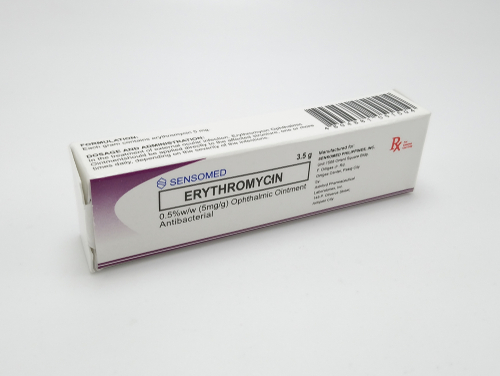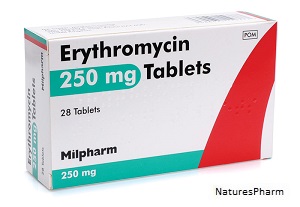What is Erythromycin?
Erythromycin is appointed for treatment of infectious and inflammatory diseases of moderate severity caused by susceptible to erythromycin microorganisms, including diphtheria, pertussis, trachoma, brucellosis, Legionnaires' disease, scarlet fever, otitis media, cholecystitis, gonorrhea, syphilis, community-acquired respiratory tract infections (pharyngitis, tonsillitis, bronchitis, pneumonia, SARS). Erythromycin is utilized in treatment of infectious-inflammatory diseases caused by pathogens resistant to penicillin, tetracycline, chloramphenicol and streptomycin.
Each erythromycin tablet contains the active ingredient, erythromycin, typically 100mg and 250mg and a range of excipients: potato starch, calcium stearate, lactose monohydrate, microcrystalline cellulose, acrylate (including a copolymer of methacrylic acid with ethyl acrylate, talc, triethyl citrate, anhydrous colloidal silica, sodium carbonate, sodium lauryl sulfate, coloring pigment: titanium dioxide E 171).
The optimal dosage for syphilis treatment is determined by a physician. In gonorrheal infection a parenteral treatment starts, followed by 250 mg every 6 hours for 7 days. In legionnaires' disease of moderate severity in adults: 500 mg orally 4 times a day within 14 days. Liver dysfunction: expedient reception controlled drug concentration in the blood serum. Renal dysfunction: dose modification is not required. Elderly patients: the prescribed dose should not be adjusted; take cautiously due to the frequent violations of the liver or bileducts. The treatment duration largely depends on the severity and infection type. Erythromycin course should be prolonged for the minimum of 2-3 days after symptoms disappear. With infections caused by group A streptococcus a minimum of 10 days. If the drug has not been administered at the appointed time, it should be taken as soon as possible, though the dosage must not be increased.
In pregnancy and lactation periods the drug can be administered to pregnant women only as a last resort (if the expected benefit to the mother outweighs the potential risk to the fetus). Erythromycin penetrates into breast milk, so women should refrain from breastfeeding. There is no data on effects on ability to drive vehicles and maintain mechanical devices. Erythromycin is contraindicated in case of hypersensitivity to the antibiotic, while taking terfenadine, astemizole, cisapride colchicine or pimozide. Erythromycin is contraindicated in those suffering from jaundice, severe hepatic impairment; in lactation period and in children under 3 years.
Erythromycin: dosing and administration
Take a pill 1 hour before eating or 2-3 hours after eating with plenty of water. The dose in children typically equals from 30 mg/kg to 50 mg/kg of body weight on a daily basis, divided into 2-4 receptions, or every 6-12 hours. In severe infections the dose can be doubled and the preparation may be appointed every 6 hours; it can be used only in children on course with a single dose at least one tablet (tablets must not be divided). In case of swallowing, the other form of preparation may be applied (e.g., syrup). The maximum daily dose is 4g. Adults are usually prescribed from 1g to 2g per day, divided into 2-4 intakes. In severe infections, the dose can be increased up to 4 grams each 24 hours and divided into several intakes.
Dosage peculiarities
Erythromycin: precautions


